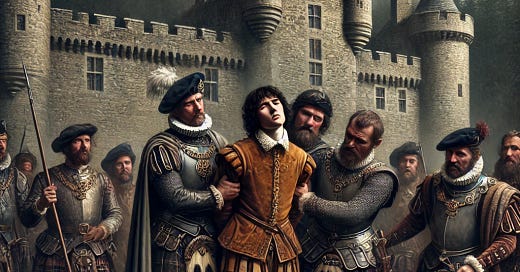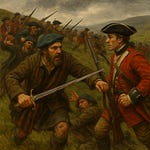Today, we're delving into a dramatic and pivotal event that took place on August 22, 1582, known as the Raid of Ruthven. This event was not just a mere power struggle but a significant chapter in the turbulent history of Scotland's monarchy and its relationship with the country's nobility.
The Raid of Ruthven was a political conspiracy orchestrated by a group of powerful Scottish nobles who sought to control the young King James VI. The key figures behind this bold move were the Earls of Gowrie and Mar, along with several other Presbyterian lords who were alarmed by the growing influence of Catholicism and the French, represented primarily by James’s favorite, Esmé Stewart, Duke of Lennox, and James Stewart, Earl of Arran. The conspirators, driven by a mixture of religious zeal, political ambition, and concern over the future of Scotland, decided to act.
The stage was set on August 22, 1582, while King James VI was hunting near the Castle of Ruthven in Perthshire. The Ruthven Lords, as they became known, saw this as their opportunity. Seizing the moment, they abducted the king and took him to Ruthven Castle. The next day, on August 23, they presented James with a lengthy "supplication" that detailed their reasons for this audacious act. The document argued that their actions were necessary to protect Scotland from foreign influence and to ensure the king's proper governance.
James VI, only 16 years old at the time, was understandably shocked and terrified by this sudden turn of events. According to historical accounts, he even broke down in tears, prompting one of the raiders, the Master of Glamis, to reportedly remark, "Better bairns greet than bearded men," using the Scots word "greet," meaning "weep" or "mourn."
The raid was a calculated move to curtail the influence of the pro-Catholic advisors surrounding James VI, particularly Lennox, who was seen as a major threat to the Protestant cause in Scotland. To prevent any rescue attempts by Lennox’s forces, the Earl of Mar stationed an armed force at Kinross, effectively cutting off any approach to Ruthven. During a skirmish, the Earl of Arran's brother, William Stewart, who had tried to reach the king, was captured and injured, losing two fingers in the process. Arran himself also fell into the hands of the raiders.
For the next ten months, King James VI was effectively held captive by the Ruthven Lords, who controlled his movements and, by extension, the governance of Scotland. They moved him between several locations, including Perth and Stirling, where they gathered additional support from other nobles such as Francis Stewart, Earl of Bothwell, and the Earl of Glencairn. During this period, the regime implemented reforms that aligned with their ultra-Protestant agenda, which was even endorsed by the General Assembly of the Church of Scotland.
However, this situation could not last. By June 1583, James managed to escape from his captors while at St. Andrews, effectively ending the Ruthven Regime. The young king, who had grown increasingly resentful of his enforced captivity, quickly reasserted his authority, dismissing the Ruthven Lords from court and pardoning those who had opposed them.
The aftermath of the Raid of Ruthven was tumultuous. While the Earl of Gowrie initially avoided severe punishment, he continued to plot against the king and was eventually executed for high treason in 1584. This marked the end of his influence and the collapse of the faction that had sought to control the Scottish crown through manipulation and force.
The Raid of Ruthven stands as a stark reminder of the fragile nature of power during this period in Scottish history. It highlights the intense rivalries and the precarious position of the young James VI, who would later become James I of England. The event also underscores the deep religious and political divides that characterized Scotland in the late 16th century.
As we reflect on the events of August 22, 1582, we see a young king caught in the crossfire of his nobles' ambitions, a nation grappling with religious and political turmoil, and the enduring struggle for control over the future of Scotland.













Share this post